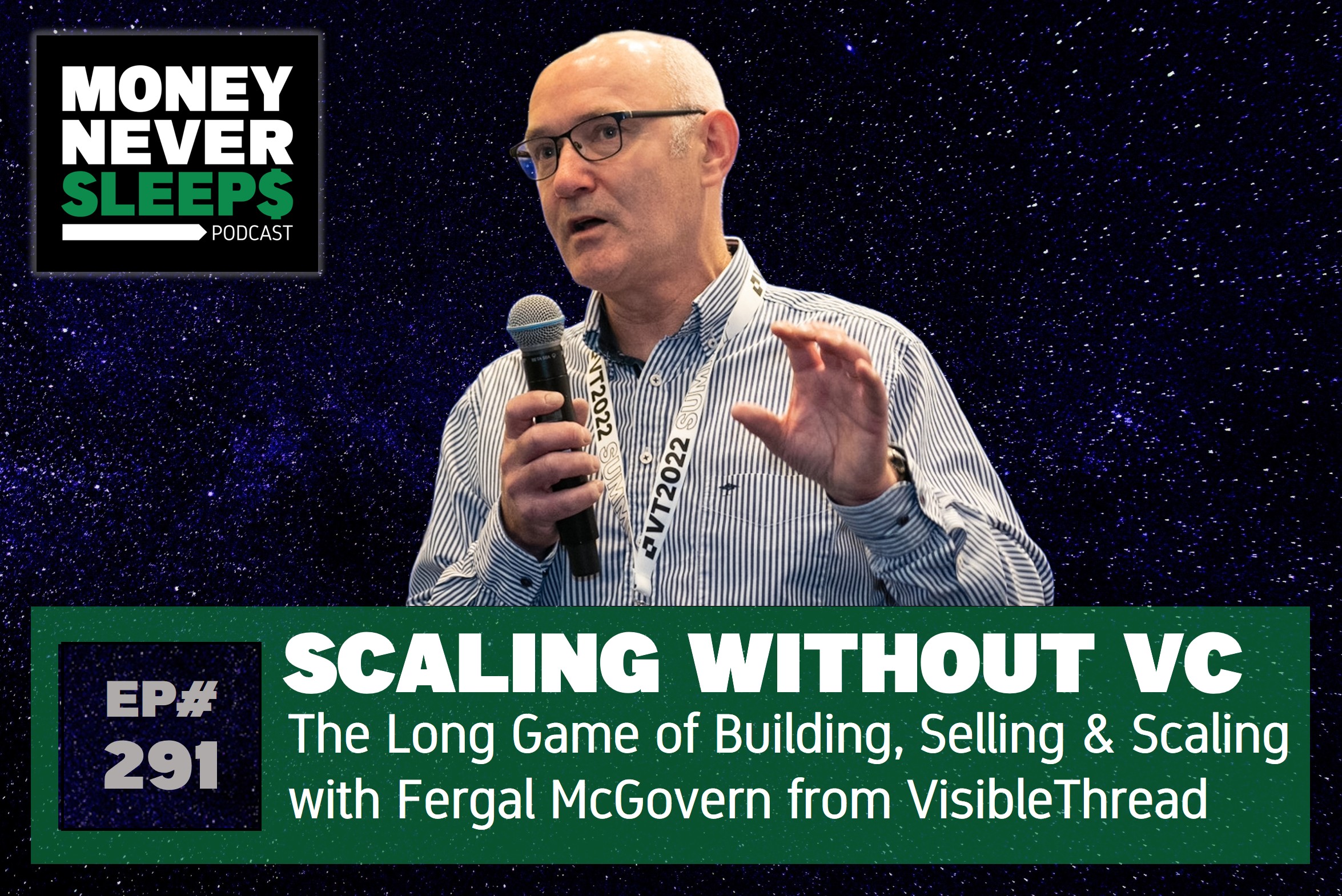132: Jump Around | Mike Cavanaugh and Regiment Alpha

Mike Cavanaugh, Managing Partner at Regiment Alpha, shares his story on lessons learned in the open outcry commodity trading pits, his multiple entrepreneurial ventures amidst a life in fintech, having things thrown at him for saying ‘blockchain’, advising and helping to raise investment for fintech startups…and the joys of barefoot water skiing behind the Cheddar Curtain!
MoneyNeverSleeps is sponsored by PAT Fintech, the training partner that demystifies fintech and digital finance for financial services professionals.
Regiment Alpha is an early-stage venture fund investing in seed-to-Series A startups in four specific areas of fintech: Payments, WealthTech, RegTech, and Capital Markets Tech. The team is based in the Mid-West US but are open to investing as a lead anywhere in the US and as a “follow” globally.
HIGHLIGHTS:
On starting his career in the open outcry trading pits at the Chicago Board of Trade (CBOT): “I started trading in the late nineties and got introduced to the trading world at an interesting inflection point where technology was really starting to heavily integrate into the exchanges. Being a 24-year-old kid that was backed by a prominent trader, you don't think when it's happening that it's ever going to go away.”
On his mindset shift to truly alternative asset classes: “I started getting into super alternative non-traditional asset classes because I saw the marketplace changing from people investing in traditional assets to things that people weren’t thinking about 10 years ago like digital assets.”
On his advisory approach in digital assets: “We started telling people to start looking at infrastructure and don’t put all your money in the coin itself. Think of the coin, think of your typical financial services infrastructure, and then identify the points within that ecosystem that are going to be needed and start investing in those companies.”
On deciding to set up a broker-dealer: “I knew we could do it. And I knew with my experience, we could execute on it, but that desire came from pure demand. I've always believed that the buy-side pushes every side of financial services. Whoever controls the money in any capacity, what they want to do is where the rest of the market and that value chain ends up moving.”
On the response after a couple of deals where investors passed because Mike and his partners didn’t have skin in the game: “I said ‘What if we started a couple of funds? What's my subject matter expertise?’ It's fintech. I've been in fintech for 20 plus years on all sides of the market. I've been in technology startups. I've seen it, done it. So, I'll start a fintech fund. I'll find fintech companies and I'll invest in them. And if I need other investors for that company, I’ll syndicate it through the broker-dealer. That was the thought.”
On his response when people thought he was crazy to set up a broker-dealer: “You can use any analogy, but it’s like your grandparents say, whatever's harder is usually the right way to do it. If it were easy, everybody would do it. It just seems that in life and in business, the hardest route is generally the right route and is the most long-term successful or profitable route.”
On what he looks for in companies: “There's never been any edge outside of information. Legal, informational edge is the only edge that exists. Everything else is BS. You can't time the market, you can't use leverage for your long-term benefit as there are two sides to leverage. The only edge is informational edge - you having information legally before somebody else and being able to act on that. So, knowing that and seeing those different points, that's where we're looking for - we're looking for edge.”
On having conviction: “You’ve got to have that conviction to stick through it. We stuck through the crypto winter and we ran this consulting firm advising startups in the blockchain and bitcoin space when a lot of people were turning their shoulders. It wasn’t crazy to get doors slammed on us or yelled at, or things thrown at us in meetings when we mentioned digital assets and bitcoin. In 2016, 2017, if you said blockchain, you got a stapler thrown at your head.”
On the benefits of survival: “We survived through that, had the conviction to get through that and really believe in the digital asset space. Now, people are calling us saying, ‘Hey, we heard you're involved in this’ and they're chewing our arms off to get looks at these deals because we'd been doing it long enough. And then people remember you.”
On the big lesson learned with startups: “It all came down to people - every time, every venture. You need a huge growing addressable market, but we look at both. You’ve got to have that big market, but your team and that team's culture, especially the leader of that team, is the most important thing, we believe, for success.
“I think that's the number one rule - it's really about people. Great people build great teams, great teams build great cultures and great cultures build great companies.”
Episode title inspired by Jump Around by House of Pain, especially when played at Camp Randall Stadium at halftime of a University of Wisconsin Badgers football game (Mike’s alma mater).
Leave a review and subscribe on Podchaser | Apple Podcasts | Spotify | Google | Overcast
Check out our MoneyNeverSleeps website
Subscribe to our newsletter on Substack
Follow us on Twitter Podcast | Twitter Pete | Twitter Eoin
Get in touch at info@moneyneversleeps.ie
--- Support this podcast: https://anchor.fm/moneyneversleeps/support































